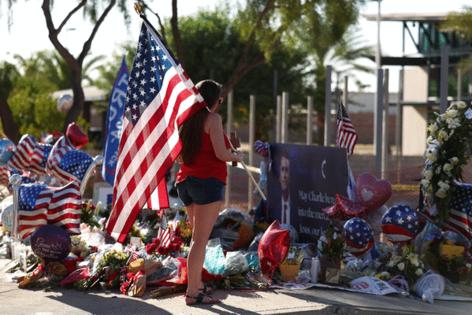Commentary: What would Charlie Kirk do?
Published in Op Eds
As a young Christian conservative growing up in a state that shamed a voice like mine, Charlie Kirk gave me the confidence I thought was impossible to find.
As I sat through high school lectures about gender ideology in a class that was supposed to teach me English literature, my teacher claimed I was a bigot for believing there are only two genders. I would sit in my chair, heart pumping and blood rushing, thinking: What would Charlie Kirk do?
He would ask questions. So, that’s what I did.
When I wrote papers in college about the false concept of systemic racism and how affirmative action is—ironically—discriminatory, my professor called me a white supremacist simply because she disagreed. When I felt so small surrounded by voices so big, I would think: What would Charlie Kirk do?
He would ask questions. So, that’s what I did.
Professors constantly told me that mixing my faith with my politics was nationalistic and discriminatory. They told me I couldn’t claim my faith publicly because it could hurt someone’s feelings. When all I wanted to do was yell and lecture, like they did to me, I would ask myself: What would Charlie Kirk do?
He would ask questions. So, that’s what I did.
Charlie never wavered from his convictions—but he sought to truly understand people. He taught me to seek to understand perspectives different from mine in hopes of finding common ground. Charlie asked questions to understand people. So that's what I will keep doing.
Charlie understood fundamentally that to reach people, you need to know why they believe what they believe. He had a way of unveiling the heart of the matter in my generation unlike anyone I’ve ever witnessed. He was able to explain concepts like taxes, gender ideology, border security and American patriotism in a way that captivated an audience of young, ambitious, yet naïve college students.
He saw fighting for conservatism as something bigger than the fight for one party over another. He knew that teaching conservative principles to Gen Z would help preserve our country so my generation — like those before us — could flourish.
The reason he was able to do this was because of his strong faith.
Charlie’s faith was evident in everything he did. He viewed everyone as a child of God, so he fought to preserve life, liberty, and the pursuit of happiness by explaining how we can only truly flourish in God alone. He was a husband and father who exemplified what it looks like to be a protector and provider.
What he stood for on countless college campuses paved the way for our bright future. He wasn’t thinking about himself; he was thinking about the generations behind him and before him.
Now, after his unjust murder, so many young conservatives are left with a confusing mix of rage and fear. I am so angry that he was taken from his wife and children. I am furious at the shooter and what his actions have done to our country. And, as uncomfortable as it can be to admit, I’m afraid. I’m afraid for college students now even further pressed to conceal their views.
Many of my friends feel the same way — and are stuck between responding with anger or fear. It’s hard to see the right path forward for our movement and our mission. So, again, I ask myself: What would Charlie Kirk do?
He would ask questions. He would engage in meaningful dialogue. He would be led by his faith and love of family. He would change hearts and minds using speech.
So that’s what we must do. Now, more than ever.
His death is the Turning Point. I pray my life will be a testimony to that.
____
Brooklyn Robinson is the Coordinator and Assistant to the Vice President for Strategic Communications at The Heritage Foundation.
_____
©2025 Tribune Content Agency, LLC.
























































Comments